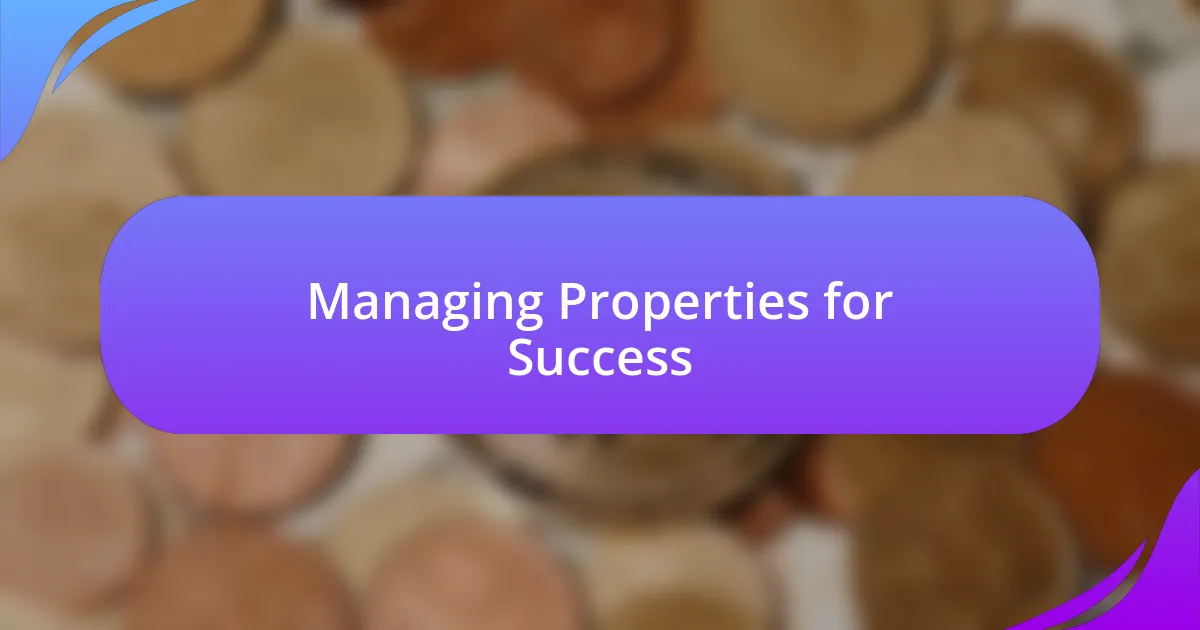Key takeaways:
- Understanding key real estate concepts such as location, liquidity, and investment goals is essential for informed decision-making.
- Building a robust network with mentors, agents, and contractors provides valuable insights and opportunities in the real estate market.
- Effective property management through regular communication and maintenance schedules significantly enhances tenant satisfaction and reduces repair costs.
- Continuous learning and adaptation to market trends, including emerging technologies and eco-friendly features, are crucial for long-term success in real estate investing.

Understanding Real Estate Basics
When I first stepped into the real estate world, it really struck me how essential it is to grasp the basic terminology. Words like “appraisal” and “equity” can feel like a foreign language at first. Understanding these concepts not only empowers you in conversations but also helps you make informed decisions during your buying or selling journey.
One of the fundamentals that has always guided me is the importance of location. The old adage “location, location, location” holds true for a reason. I recall the time I visited a seemingly perfect property that was just a block away from a busier street. That hidden noise and commuter chaos quickly erased its appeal. So, what makes a location work for you? Look at schools, amenities, and future growth potential—all these factors determine not just a place to live, but also an investment’s potential.
Liquidity is another basic aspect that often gets overlooked. It’s quite eye-opening to realize that selling a property can take time, unlike stocks that can be quickly liquidated. I learned this when a great opportunity came my way, but my own property sat on the market far longer than I anticipated. That experience pushed me to appreciate the reality of real estate investments, reminding me to always plan for the unexpected.

Identifying Your Investment Goals
Identifying your investment goals is the first step in crafting a successful real estate strategy. I remember when I started out; I was filled with excitement but also a sense of confusion about what I truly wanted to achieve. Was it cash flow, appreciation, or perhaps a flip? I found it helpful to write down my priorities because that clarity kept me focused and aligned on my investment path.
Each investor’s goals will be different, and that’s perfectly normal. From my experience, some folks aim for long-term wealth through buy-and-hold strategies, while others chase quick returns by flipping properties. Understanding what you want out of real estate will not only guide your property selections but also shape your overall approach. I’ve learned that investing with intention allows for more confidence in decision-making, ultimately leading to greater satisfaction with the outcomes.
As I shifted from a novice to a more seasoned investor, I began to see patterns in my objectives. I realized that aligning my investments with my life goals—whether that meant paying for my children’s education or planning for early retirement—enhanced my motivation and commitment. This process isn’t just about numbers; it’s deeply personal and profoundly impactful on one’s future. Reflect on your own aspirations and let them be your compass in the bustling world of real estate investing.
| Investment Goals | Description |
|---|---|
| Cash Flow | Income generated from rental properties. |
| Appreciation | Increase in property value over time. |
| Flipping | Buying properties to renovate and sell quickly for profit. |
| Tax Benefits | Deductions available through real estate investment. |

Building a Strong Network
Building a strong network in real estate is crucial, and I’ve come to appreciate its value over the years. When I first entered the industry, I often felt like I was navigating a maze alone. It wasn’t until I attended local real estate meetups that I realized the power of connection. Conversations with seasoned investors opened my eyes to opportunities I would have otherwise missed.
From my experience, a robust network can provide insights, partnerships, and even lead to off-market deals. Here’s a concise list of key connections to prioritize:
- Mentors: Find someone who has been in the game longer than you. Their guidance can be invaluable.
- Real Estate Agents: They have their finger on the pulse of market trends and can help you identify properties.
- Contractors: You’ll want reliable professionals to rely on when flipping or renovating properties.
- Finance Experts: Mortgage brokers can offer advice on financing options and help you secure the best rates.
- Investors: Connect with other investors to share insights, discuss strategies, and work together on potential deals.
Networking isn’t just about exchanging business cards; it’s about building relationships that can foster growth and support throughout your real estate journey.

Analyzing Market Trends Effectively
When it comes to analyzing market trends effectively, I’ve learned that data is just as important as intuition. Early in my career, I would often rely solely on my gut feelings about a neighborhood, but this led me to some unexpected outcomes. Now, I combine hard data—like price per square foot and inventory levels—with my personal observations to get a clearer picture of what’s really happening.
One key strategy I adopt is breaking down trends into digestible pieces. For instance, I’ve found that looking at a mix of long-term and short-term indicators helps me see the broader picture. Recently, while analyzing a neighborhood I was interested in, I noticed how average days on the market were decreasing, suggesting rising demand. It really hit me then: understanding these metrics can be the difference between a successful investment and a misstep.
I also make it a point to keep an eye on economic indicators like employment rates and local development plans. These elements often foreshadow shifts in the real estate landscape. I remember a time I overlooked a new tech company moving into an area, which ultimately drove up property values faster than I expected. Have you ever missed a trend and felt the sting later? I certainly have, and now I approach market analysis with a more comprehensive lens to avoid such pitfalls in the future.

Financing Your Real Estate Investments
When I first started investing in real estate, I quickly realized that financing is one of the most critical aspects of the journey. I recall my initial experience when I rushed into a property purchase without understanding my financing options. The stress of looming payments made me wish I had taken the time to explore various financing sources, from traditional mortgages to private lenders. Have you ever felt overwhelmed by choices? It’s definitely a common experience in real estate!
One of the strategies that has worked well for me is developing relationships with local banks and credit unions. I remember a conversation with a loan officer who took the time to explain the nuances of different loan products, which ultimately led to securing a favorable rate for my first investment property. This personalized approach not only gave me confidence but also opened up opportunities I hadn’t considered before.
Ultimately, I believe having a clear financing plan is vital. I often set aside time to assess my budget and understand my cash flow. For instance, after purchasing a property, I realized I could leverage some of the equity to fund my next investment. It was a game changer! How proactive are you about financing your investments? Taking control of your financing strategy can truly set the stage for long-term success in real estate.

Managing Properties for Success
Managing properties effectively is a cornerstone of success in real estate. Early on, I underestimated the importance of regular communication with tenants. I remember a situation where a small leak went unreported for weeks simply because the tenants felt hesitant to reach out. Learning to create a friendly atmosphere encouraged them to share those issues promptly, saving me time and money on bigger repair costs.
One practical strategy that I adopted is implementing a maintenance schedule. I’ve found that anticipating maintenance needs not only keeps properties in top shape but also builds trust with tenants. For example, after instituting annual HVAC checks, I noticed remarkable tenant satisfaction and fewer emergency calls. Isn’t it fascinating how a proactive approach leads to happier tenants and smoother operations?
Understanding local laws around property management has also played a significant role in my success. Initially, I was caught off guard by a rental dispute related to tenant rights, which meant I had to navigate a lengthy resolution process. Since then, I’ve made it a priority to stay informed about my area’s regulations. How equipped do you feel to handle potential legal challenges? I often visit law seminars or read up on legal changes, knowing that being well-versed can save not just headaches but also resources down the line.

Continuous Learning and Adaptation
Continuous learning and adaptation are vital in the ever-evolving landscape of real estate. I vividly recall attending a workshop on emerging property technologies, which opened my eyes to automation’s potential. It was a game-changer for me; I quickly integrated property management software that streamlined my communication and record-keeping. Have you considered how technology might simplify your operations?
Each market shift presents a new learning opportunity, and I’ve learned to keep my finger on the pulse of industry trends. For instance, I remember reading about the rising demand for eco-friendly features in rental properties. This prompted me to explore sustainable upgrades, enhancing the appeal of my listings and attracting a more conscientious demographic. Isn’t it exciting how a small investment can lead to higher returns?
Networking has been instrumental in fine-tuning my approach. I often engage in local real estate groups where sharing experiences enriches my understanding. Recently, a fellow investor shared insights on dealing with inflation and rising costs, which inspired me to reassess my pricing strategy. What insights are you missing out on by not connecting with others in the field? Embracing these conversations has been foundational in adapting my methods and staying ahead of the curve.















